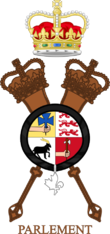Parliament of Quebec
| Parlement de Québec et Versailles (fr) | |
|---|---|
| Québécois Parliament (current) | |
 | |
| Type | |
| Type | |
| Houses | House of Lords • House of Commons |
| History | |
| Founded | 27 April 2019 |
| Preceded by | |
| Leadership | |
King and Princess Speaker | Aidan I and Vacant |
Speaker | Logan Lott |
| Structure | |
 | |
Lords political groups |
|
 | |
Commons political groups |
|
| Elections | |
Last general election | 27 April 2019 |
| Constitution | |
| Constitution of the Kingdom of Quebec and Versailles | |
| Acts | |
| Acts of the Parliament of Quebec | |
The Parliament of Quebec and Versailles (French: Parlement de Québec et Versailles) is the Unitary legislature of Quebec. The body consists of the Quebecois monarch; an upper house, the House of Lords; and a lower house, the House of Commons. Each element has its own Speaker or leader of the chamber. Additional to this, the monarch provides royal assent to make bills into law.
The members of the House of Lords are drawn from peerage, while the 21 members of the House of Commons—called members of parliament (MPs)—each represent a Country in the Kingdom or, a Dominion. The Monarch also summons Parliament, and can prorogue or dissolve Parliament, the latter in order to call a general election. He will read the Throne Speech, the King has all Absolute power.
Composition
The Parliament of Quebec is composed of two parts with no physical power in government: the Monarch lead, House of Lords, and the House of Commons. both have a distinct roles, but work in conjunction within the legislative process. This format was ideally inspired by the United Kingdom, but has its major differences.
Only those who sit in the Parliament are usually called members of parliament (MPs). Peers also take higher positions in the national order of precedence. No individual may serve in more than one chamber at the same time.
House of Lords
The House of Lords is made up of the major peers of Quebec and is mostly ran by the Monarch, and sometimes the Monarchs consort. the Monarch provides royal assent to bills to make them law, and makes speeches from the throne. It is mandatory that the major peers must attend, while royal and stranger peers hold a seat, however aren't required to sit thereon. Peers-by-marriage are also not required to sit thereon.
List of peers
| Peer | Party | Type | |
|---|---|---|---|
| The King Aidan I | None | King | |
| Consort of King | None | Princess | |
| Lord Baron of Columbia | Communist-Socialist Party | Baron | |
| 20 Vacant | |||
House of Commons
The House of Commons is made up of members chosen through first-past-the-post voting by people of their ridings.
| Member | Party | Riding | ||
|---|---|---|---|---|
| 0 | Logan Lott (Speaker) | Independent | Versailles | |
| 1 | Abrams Wiucki-Dunswed | Québécois National Congress | Dominion of Âme | |
| 2 | Jackson Muse | Québécois National Congress | Dominion of Âme | |
| 3 | Jack Morris | Conservative Party of Quebec | unknown | |
| 4 | N/A | Communist-Socialist Party | Quebec | |
| 5 | N/A | Communist-Socialist Party | Quebec | |
| 6 | N/A | Communist-Socialist Party | Quebec | |
| 7 | N/A | Communist-Socialist Party | Quebec | |
| 8 | N/A | Communist-Socialist Party | Versailles | |
| 9 | N/A | Communist-Socialist Party | Versailles | |
| 9-21 | Vacant | |||
Jurisdiction
The powers of the Parliament of Quebec allow it to pass laws relating to, among other things, the postal service, census, military, navigation and shipping, fishing, currency, banking, weights and measures, bankruptcy, copyrights, patents, and naturalization, as long as it as been approved by the Monarch and royal assent, if not the Monarch has the right to overrule any bills, acts or laws. Countries don't have it's own legislature, however bills relating to the Countries are introduced to the House of Commons through their MP.